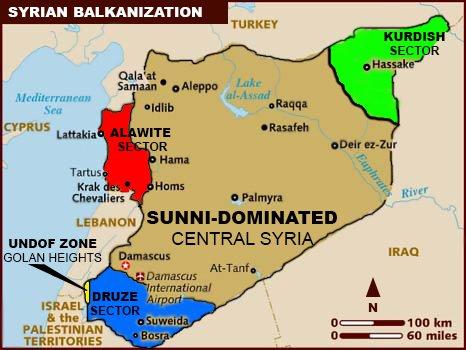To call Syria a hornets nest would be an insult to hornets everywhere. And, to be fair, hornets don’t deserve the comparison. They are actually among nature’s greatest altruists. Thanks to the unique genetic process called haplodiploidy, the hornets in a nest are all more closely related to each other than human brothers and sisters are. A hornet does not think twice about sacrificing itself for the hive. And no hornet would ever use sarin gas on a member of its own nest.
Syria, by contrast, is a freaking mess. Thanks largely to our friends across the pond, who carved the old Ottoman Empire into ethnically incoherent things and called them “countries,” Syria contains Arabs and Alawites, and Kurds, and Christians and Jews and Muslims, and, among Muslims, Sunni, Shia, and Druze. Ethnically, religiously, and linguistically, it combines all of the worst features of Iran, Iraq, Afghanistan, and Canada. No rational American administration should even consider a military intervention in the Syrian war.
It is important to note, however, that nobody is actually considering military intervention in Syria. What the Obama administration has proposed is a military punishment. Their theory, as I understand it, goes something like this: Bashar al-Assad is a rational actor who has used chemical weapons to gain a military advantage. In doing so, he has flouted the international conventions against using weapons of mass destruction. Since Assad is a rational actor, the only way to make sure that he does not use these weapons again—and that other rational actors who happen to be brutal dictators do not use such weapons—is to ensure that the military cost he incurs outweighs any military benefit he stands to realize.
It is not a bad theory, and the math actually works out pretty well. There are, however, two flaws in the approach that I think are fatal. The first is that, when things like dynasty-ending civil wars are involved, nobody is really a rational actor. We have no idea what Bashar al-Assad will do as his grip on power loosens, and a military plan that treats him like a computer chess program is probably not going to work.
Even if the argument is sound generally, however, it does not follow that the United States should accept the responsibility to enforce the minimal moral standards that the international community believes should apply to war. America is not the international community, nor does that community require, or even desire, that we act unilaterally on its behalf. Since the end of the Cold War, however, we have felt more and more compelled to use our own blood and treasure to punish bad countries for doing bad things—even when our own interests are not really on the line. This, I think, has been a bad thing.
Not all of our recent military adventures have been punitive. The First Persian Gulf War and the bombings in Kosovo, for example, were interventions designed to influence an outcome. The invasion of Afghanistan, on the other hand, was a punishment for the 9-11 bombings (which at least, was something that was done to us). And the invasion of Iraq was, at best, a punishment for supposed violations of international norms. We can see a fairly clear pattern emerging here: the recent military actions that the United States has taken to accomplish military ends have faired well. The actions we have taken to punish real or supposed violations of international law have not.
Economists and evolutionary biologists have a term for those willing to incur costs in order to enforce community norms. Such individuals are called “altruistic punishers,” and the annals of history are full of their tales—from Sampson destroying the Temple at Philistia to Hamlet uncovering Claudius’ treachery to Dietrich Bonhoeffer plotting to assassinate Adolph Hitler. There is a role for such actors in the society of people, and for such nations in the society of nations. Altruistic punishers are generally well thought of. But they almost always die. And the leaders of the United States have not been elected to bring our nation to ruin by trying to slap the wrists of every dictator in the world.
